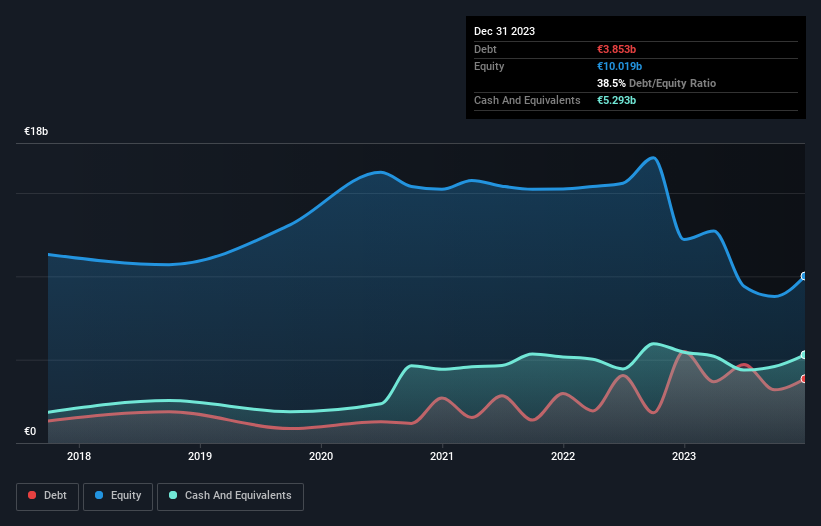The external fund manager backed by Berkshire Hathaway's Charlie Munger, Li Lu, makes no bones about it when he says 'The biggest investment risk is not the volatility of prices, but whether you will suffer a permanent loss of capital.' It's only natural to consider a company's balance sheet when you examine how risky it is, since debt is often involved when a business collapses. We note that Siemens Energy AG (ETR:ENR) does have debt on its balance sheet. But the real question is whether this debt is making the company risky.
When Is Debt Dangerous?
Generally speaking, debt only becomes a real problem when a company can't easily pay it off, either by raising capital or with its own cash flow. In the worst case scenario, a company can go bankrupt if it cannot pay its creditors. However, a more usual (but still expensive) situation is where a company must dilute shareholders at a cheap share price simply to get debt under control. By replacing dilution, though, debt can be an extremely good tool for businesses that need capital to invest in growth at high rates of return. The first thing to do when considering how much debt a business uses is to look at its cash and debt together.
See our latest analysis for Siemens Energy
What Is Siemens Energy's Net Debt?
As you can see below, Siemens Energy had €3.85b of debt at December 2023, down from €5.49b a year prior. But it also has €5.29b in cash to offset that, meaning it has €1.44b net cash.

A Look At Siemens Energy's Liabilities
Zooming in on the latest balance sheet data, we can see that Siemens Energy had liabilities of €30.9b due within 12 months and liabilities of €7.56b due beyond that. Offsetting this, it had €5.29b in cash and €11.0b in receivables that were due within 12 months. So its liabilities total €22.2b more than the combination of its cash and short-term receivables.
Given this deficit is actually higher than the company's massive market capitalization of €15.1b, we think shareholders really should watch Siemens Energy's debt levels, like a parent watching their child ride a bike for the first time. Hypothetically, extremely heavy dilution would be required if the company were forced to pay down its liabilities by raising capital at the current share price. Given that Siemens Energy has more cash than debt, we're pretty confident it can handle its debt, despite the fact that it has a lot of liabilities in total. When analysing debt levels, the balance sheet is the obvious place to start. But ultimately the future profitability of the business will decide if Siemens Energy can strengthen its balance sheet over time. So if you're focused on the future you can check out this free report showing analyst profit forecasts.
Over 12 months, Siemens Energy reported revenue of €32b, which is a gain of 5.3%, although it did not report any earnings before interest and tax. We usually like to see faster growth from unprofitable companies, but each to their own.
So How Risky Is Siemens Energy?
While Siemens Energy lost money on an earnings before interest and tax (EBIT) level, it actually generated positive free cash flow €143m. So taking that on face value, and considering the net cash situation, we don't think that the stock is too risky in the near term. We're not impressed by its revenue growth, so until we see some positive sustainable EBIT, we consider the stock to be high risk. For riskier companies like Siemens Energy I always like to keep an eye on the long term profit and revenue trends. Fortunately, you can click to see our interactive graph of its profit, revenue, and operating cashflow.
If, after all that, you're more interested in a fast growing company with a rock-solid balance sheet, then check out our list of net cash growth stocks without delay.
New: Manage All Your Stock Portfolios in One Place
We've created the ultimate portfolio companion for stock investors, and it's free.
• Connect an unlimited number of Portfolios and see your total in one currency
• Be alerted to new Warning Signs or Risks via email or mobile
• Track the Fair Value of your stocks
Have feedback on this article? Concerned about the content? Get in touch with us directly. Alternatively, email editorial-team (at) simplywallst.com.
This article by Simply Wall St is general in nature. We provide commentary based on historical data and analyst forecasts only using an unbiased methodology and our articles are not intended to be financial advice. It does not constitute a recommendation to buy or sell any stock, and does not take account of your objectives, or your financial situation. We aim to bring you long-term focused analysis driven by fundamental data. Note that our analysis may not factor in the latest price-sensitive company announcements or qualitative material. Simply Wall St has no position in any stocks mentioned.
About XTRA:ENR
High growth potential with solid track record.
Similar Companies
Market Insights
Community Narratives



